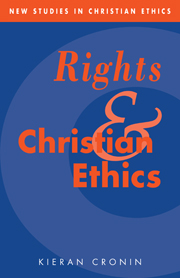Book contents
- Frontmatter
- Contents
- General editor's preface
- Preface
- 1 Metaethics: meaning and justification
- 2 Initial elucidation of rights-language
- 3 Conceptual scepticism and rights
- 4 Moral and theological scepticism
- 5 Imagination, metaethics and rights
- 6 Theological imagination and rights
- 7 Rights, power and covenant
- 8 Theological foundations of rights-language
- Epilogue
- Notes
- Index
7 - Rights, power and covenant
Published online by Cambridge University Press: 29 September 2009
- Frontmatter
- Contents
- General editor's preface
- Preface
- 1 Metaethics: meaning and justification
- 2 Initial elucidation of rights-language
- 3 Conceptual scepticism and rights
- 4 Moral and theological scepticism
- 5 Imagination, metaethics and rights
- 6 Theological imagination and rights
- 7 Rights, power and covenant
- 8 Theological foundations of rights-language
- Epilogue
- Notes
- Index
Summary
Having examined the freedom model of rights from the Christian ethical perspective in the last chapter, we now move on to consider the power model of rights from the same perspective. Again we build our model on insights taken from some key theological writings, as well as from a humanistic psychological approach to power which contributes to our Christian understanding of that subject. This psychological approach complements the political science analysis studied in the last chapter, especially in the link between ‘authority’ and what is called ‘integrative power’ or ‘power with’ others.
The most challenging aspect of this religious analysis of power will derive from our examination of recent ideas on the ‘power’ of God and of his Son, Jesus. In particular we will encounter the notion of power-in-weakness and the aspect of power as seen in the experience of patient waiting for the response of others to rights-claims.
Finally, a major part of this chapter will be devoted to the introduction and development of a further model of rights, a covenant model, which straddles the divide between secular and religious morality. The rich distinctions found in the biblical theology of covenant provide a promising model of rights, which has added value in being closely related to the models of freedom and power.
Theologians, like philosophers, tend to recognise the ambiguity of the term ‘power’. Not only are there different kinds of power, from the impersonal electric current to the spiritual ‘power’ of prayer, but the word has definite pejorative meanings or negative associations, especially when we think of political life.
- Type
- Chapter
- Information
- Rights and Christian Ethics , pp. 183 - 232Publisher: Cambridge University PressPrint publication year: 1993



